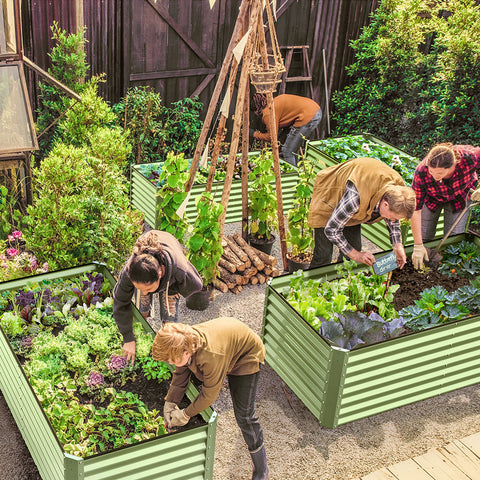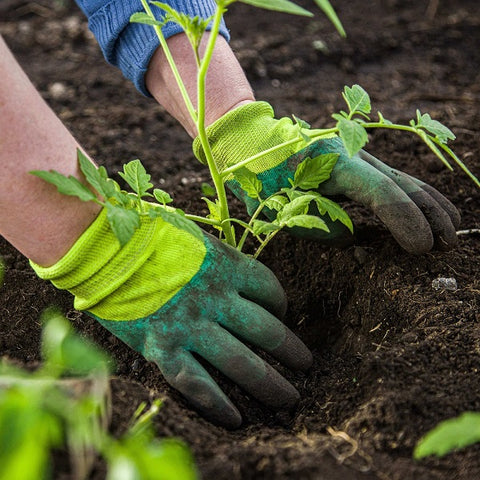What are the best fruits and vegetables you can grow?Finding the best fruits and vegetables is not as easy as I imagined. Some require extensive care, while others are prone to pests, and many do not grow easily and quickly enough. That's why I have listed the 10 best fruits and vegetables you can grow! Before planting fruits and vegetables, it is crucial to read and understand the cold resistant areas where you live in order to understand the best fruits and vegetables that can be grown.The following content also has some reference value for raised garden beds.
- Apple Tree
Apple trees thrive in cold spring and cool autumn. Unlike other fruits, flowers and fruits can grow even in late spring when there is snow or frost.
Easy to grow: Apple trees may be the easiest fruit to plant. You don't need fertilization or watering, you can plant in any soil, and if there is one, it only requires minimal pruning.
Perfect for any property: Apple trees are perfect for any gardener's yard, which means they are perfect for small or large gardens.
Harvest: Among all the fruit trees on this list, the apple tree is one of the trees with the heaviest harvest. From late August to November, you can pick more apples than you can eat.
These may harm your apple tree, as deer, rabbits, and squirrels like apple trees. If left unprotected, these pests will eat your fruit before it fully grows. You must constantly spray and care for your apple tree to prevent pest infestation
Disease: Similarly, among all fruit trees on this list, apple trees are the most susceptible to illness. Fusarium wilt and mold are only two diseases that attack, damage, and sometimes even kill fruit trees in spring or summer.
- Lettuce
Lettuce grows vigorously in cold spring and cool autumn. Unlike other vegetables, this plant can grow even with snow or frost on the ground.
Lettuce may be the easiest vegetable to grow. You don't need to fertilize it, just water it once a week, and it can be planted in any soil. Lettuce can be harvested all year round. The more lettuce you harvest, the more it will grow.
Deers, rabbits, and squirrels all like lettuce. If left unprotected, these pests will eat your vegetables before they grow.
Extreme high temperatures, although rare, can cause your lettuce to bloom and become inedible. To avoid this situation, it is important to plant lettuce in a partially shaded area.
- Kale
Kale is the most hardy vegetable. Unlike any other vegetable on the list, kale can be grown year-round.
Kale is the only vegetable on this list that can be considered an ornamental plant. This means that it can add color, characteristics, and aesthetics to any type of garden.
If there is any vegetable that can be grown in a gardening pot, it is kale. This is one of the most adaptable vegetables and is very suitable for beginners to grow.
These may harm your kale. Aphids: Like many other vegetables, aphids are an insect you don't want. Aphids are particularly common and can cause cabbage to wilt or die.
Extreme high temperature: Like lettuce, kale is not resistant to extreme heat. In temperatures above 90 degrees Celsius for just one week, under direct sunlight and Fahrenheit, kale will bloom and become inedible.
- Blueberries
Blueberry shrubs thrive in cold spring and cool autumn. Unlike other fruits, flowers and berries can grow even in late spring when there is snow or frost.
Blueberries may be one of the fastest growing berry shrubs. With just a little peat moss and fertilizer, you can expect your shrubs to grow to 6 feet tall in a few years and produce more berries than you know.
Blueberry shrubs are prone to illness. Mold and root rot are only two diseases that harm, attack, and kill blueberry shrubs in winter and spring.
- Figure
Pest resistance:
The fig tree is the only fruit tree on this list that truly has insect resistance. Deers hate fig trees, rabbits cannot reach fruits, and squirrels and chipmunks are more likely to find food elsewhere.
Perfect for indoor and outdoor use:
There are no other fruits on this list that can be grown indoors or outdoors. Fig trees can thrive outdoors, but most gardeners plant them in flower pots, leave them outdoors during the summer months, and bring them indoors after the first frost of the year.
Easy to grow: Once you plant fig trees in a gardening pot, you don't need to do anything else. You don't have to worry about insects or diseases, just water it once a week, and don't even have to worry about pruning it to grow figs.
Although some types of fig trees can survive and perform well in winter, most fig trees may develop slowly, fail to bear fruit, and may even die. If you put the fig tree in a pot, drought will cause it to wither. This is because the fig trees in the pot dry faster than those in the ground.
- Tomatoes
With the warming of summer, tomatoes are getting bigger and more. Stop looking for low maintenance vegetables.
Tomatoes are considered a vine vegetable. Because of this, you can train them to grow vertically, which is very suitable for gardeners with very small spaces. Tomatoes are very suitable for small spaces, which means they are very suitable for potted plants. Just plant them in a small flower pot and enjoy them in your city and suburban property.
Tomatoes are one of the most susceptible vegetables to insects. Aphids, fruit worms, and even stinking insects like to eat them. If you wait too long to harvest, then all these insects will become a problem.
Tomatoes are also one of the most susceptible vegetables, especially heirloom variants. It is expected that wilt, fungi, and horse chestnut rot will affect your plants in late summer (even if you take appropriate care of them).
- Strawberries
Strawberries cannot tolerate cold weather well. Although some varieties can survive in cold weather, if the winter temperature continues to drop below 10 degrees Fahrenheit, most varieties will die. In winter, you should always lay hay, leaves, or burlap on top.
When planting strawberries, you should often protect them with fences or bird nets to protect the flowers and berries from birds, chipmunks, and squirrels.
- Pepper
These low maintenance vegetables like high temperatures. The hotter the summer, the better the chili peppers. The longer summer lasts, the more chili peppers there are.
When it comes to vertical gardening, chili peppers are one of the vegetables you may not expect, but they are just as good as other vegetables. This makes it very suitable for small spaces, even in flower pots.
Chili peppers, like most plants on this list, cannot tolerate cold weather. If the temperature drops below 50 degrees Fahrenheit, your tree will not grow or produce chili peppers. If the temperature drops below zero, your chili peppers will wither.
Chili peppers are prone to getting sick in late summer. It is expected that wilt, fungi, and rot diseases will affect your plants in the later stages of the chili harvest season.
- Squeeze
Unlike other vegetables, pumpkin does not require a large amount of water for growth, flowering, and flowering, and can be harvested multiple times. This is great for exceptionally dry summers.
Perfect for vertical gardening: If you want a vegetable that can grow to the extreme, don't look at pumpkins anymore. Pumpkins can spread well horizontally, but they can also grow well vertically.
Pumpkin is another vegetable that has poor efficacy against pests. Deers, rabbits, and other animals can eat the flowers, leaves, and even stems of plants.
- Lemon Tree
Among all the fruit trees on this list, lemons will thrive in high temperatures. This is because they grow naturally in warm climate conditions. Best of all, you almost don't need to water or take care of them to achieve success.
Perfect for potted plants: Lemon trees can only grow in pots. If you want a fruit tree that can be easily moved from indoors to outdoors, kept indoors all year round, or even just an ornamental tree, then don't look at it anymore.
Lemon trees are the most sensitive fruit trees on this list to cold weather. If the temperature drops below 50 degrees Fahrenheit, your tree will not grow or bear fruit. If the temperature drops below zero, your lemon tree will die.









